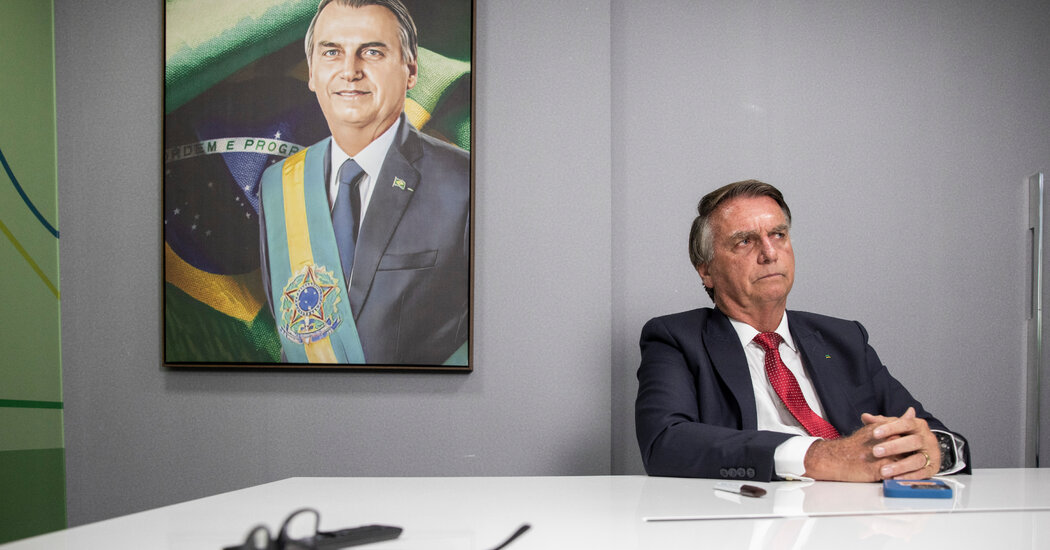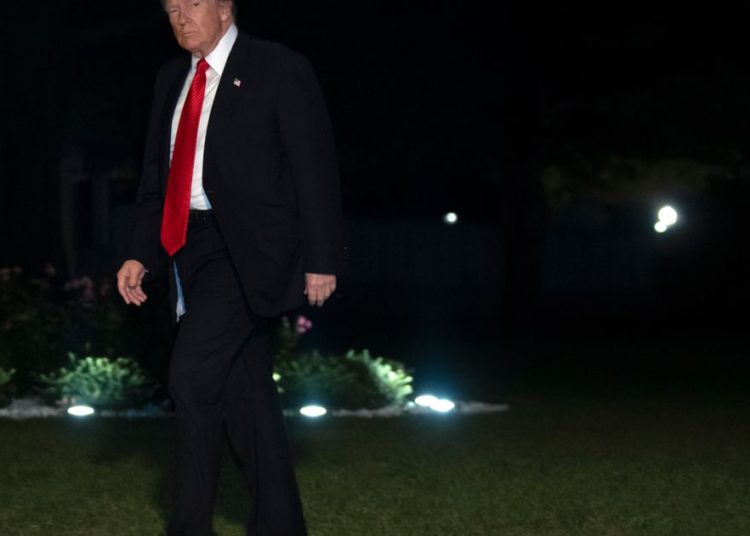Brazil will put former president Jair Bolsonaro on trial next week on charges of attempting a coup after losing the 2022 election. If convicted, he could face decades in prison.
Many Brazilians — and many Americans watching from afar — see this moment as a triumph of democracy.
Brazil, which emerged from a brutal dictatorship just 40 years ago, will have accomplished something that the United States could not: bring a former president to trial on criminal charges that he attempted to cling to power after losing an election.
Yet the way Brazil did it has left the nation grappling with uncomfortable questions over the very democracy it sought to protect.
Those questions begin with Brazil’s Supreme Court.
Over the past six years, the court has given itself extraordinary new powers to confront what it viewed as an extraordinary threat posed by Mr. Bolsonaro and his attacks on institutions. For the first time, the court could launch and lead its own sprawling investigations, even when the victim was the court itself.
To carry out that new authority and pursue Mr. Bolsonaro, the court empowered one hard-charging justice, Alexandre de Moraes.
During the time Mr. Bolsonaro led the country from 2019 through 2022, the president and his supporters threatened judges, questioned elections, floated the idea of a military takeover and unleashed a wave of falsehoods carried far by the internet.
In response, Justice Moraes ordered raids, censored online accounts, blocked social networks and, in some cases, jailed people without a trial.
Those efforts resulted in a successful transfer of power despite Mr. Bolsonaro’s refusal to admit he was voted out — and now the swift prosecution of the former president and his allies.
But it has also raised a complicated question: Is this a dangerous, authoritarian turn for Brazil’s highest court? Or is it an imperfect democracy trying its best to deal with an authoritarian threat in the internet age?
“How did the court react? With various failures, with a series of errors,” said Walter Maierovitch, a jurist and retired judge from São Paulo’s Court of Justice. “These errors do not erase or justify the coup attempt. But they should not be repeated.”
For years, Brazil had been grappling with this debate on its own. Then, last month, President Trump stepped in.
In a stunning intervention, Mr. Trump sent a letter to Brazil’s president, Luiz Inácio Lula da Silva, demanding that the charges against Mr. Bolsonaro be dropped. He called the case a “witch hunt” and said he sees himself in Mr. Bolsonaro — a maverick leader politically persecuted by the “Deep State.” Since then, he has launched a multi-front offensive of steep tariffs, a trade investigation and severe sanctions on Justice Moraes.
Those moves have appeared to only harden the resolve of the Brazilian government and judiciary.
“The process must proceed freely, without political interference,” Brazil’s president, Mr. Lula, told us last month in an interview. “I can assure you that Alexandre de Moraes is a serious person,” he added. “I place full trust in the judiciary to do its job.”
Justice Moraes, who declined to be interviewed for this article, has long pointed to the support of his Supreme Court colleagues on many of his rulings. He is presiding over Mr. Bolsonaro’s trial and, in recent weeks, he has vowed to stay the course.
“There isn’t the smallest of possibilities of retreating even one millimeter,” he told The Washington Post this month.
Gilmar Mendes, the Supreme Court’s longest-serving justice, said in an interview on Thursday that criticism should be directed at Mr. Bolsonaro and his allies, not the court.
“They say we’re the ones abusing our power?” he said. “If we had cowered and not acted, they would most likely have shut down” Brazil’s elections agency.
By late last year, some Brazilian officials, jurists and constitutional lawyers were raising concerns that Justice Moraes lacked accountability and had refused to yield his expanded powers even though Mr. Bolsonaro had been out of office for two years.
But now the Brazilian government and Supreme Court have fully hitched the country’s democracy to Justice Moraes.
On July 30, the United States hit Justice Moraes with sanctions, accusing him of “an oppressive campaign of censorship, arbitrary detentions that violate human rights, and politicized prosecutions.” Brazil’s Supreme Court responded by backing Justice Moraes and his decisions. On the same day, Mr. Lula invited the justices to dinner at the presidential palace in a show of support.
Last week, another Supreme Court justice ruled that foreign measures effectively cannot be enforced in Brazil without the high court’s approval — a decision widely seen as an effort to shield Justice Moraes from the sanctions’ financial penalties.
Perhaps most significantly, the president of Brazil’s Senate, the institution tasked with holding the Supreme Court accountable, said he would not hold a vote on impeaching Justice Moraes despite fellow senators claiming to have enough votes to recall the judge.
Brazilians appear divided. About 46 percent support impeaching Justice Moraes, while 43 percent oppose the measure, according to a survey this month by Quaest, a Brazilian polling firm. The same survey found that 52 percent of Brazilians believe Mr. Bolsonaro attempted a coup, versus 36 percent who do not.
On Sept. 7, Brazil’s Independence Day, the Brazilian right is planning mass protests to call for the impeachment of Justice Moraes and denounce the prosecution of Mr. Bolsonaro.
But in Brasília, the nation’s capital, there is an air of inevitability to Mr. Bolsonaro’s conviction.
The evidence against Mr. Bolsonaro, collected by the police over nearly two years, is extensive. He himself has said he discussed ways to hold on to power, while stressing that all the options he was mulling were measures laid out in the country’s Constitution.
To find Mr. Bolsonaro guilty, three of the five Supreme Court justices who are overseeing his trial must vote to convict. That is considered highly likely, since the panel includes Justice Moraes; another justice who is Mr. Lula’s former justice minister; and a third who is Mr. Lula’s former personal lawyer.
Beyond the trial, Brazil’s Supreme Court must also weigh whether to continue to deploy its enormous power as the country braces for next year’s presidential election — another test of its electoral process in a deeply polarized and extremely online nation.
The court may again be called upon — or may take it upon itself — to play referee.
With Mr. Bolsonaro’s actions, “the Supreme Court was forced into territory it had never entered before,” said Conrado Hübner Mendes, a constitutional law professor at the University of São Paulo.
But, he added, justices must not allow individual interests and politics to taint their decisions, just as it takes charge of its nation’s most crucial debates. “It leaves it institutionally fragile,” he said.
Jack Nicas is the Brazil bureau chief for The Times, leading coverage of much of South America.
The post Brazil’s Democratic Quandary: How to Prosecute a President appeared first on New York Times.




